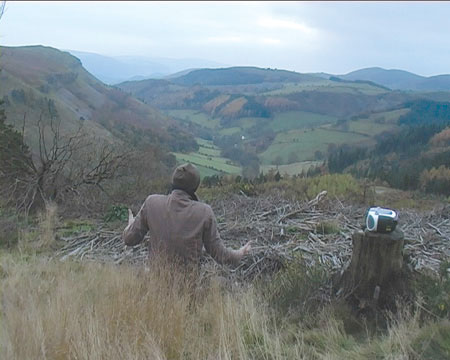
Richard T. Walker, "Successive Inconceivable Events," 2005
Single channel DVD projection or monitor rt: 6:18, dimensions variable
Photo: courtesy Christopher Grimes Gallery
From the inflated landscapes of April Gornik to the withered dioramas of Roxy Paine, most contemporary depictions of nature are still rooted in historical notions of the sublime. Formulated primarily in the 17th and 18th centuries by Kant and Burke, their theories held that the terror, helplessness and overwhelming indeterminacy encountered before nature's grandeur would eventually inspire a sense of transcendence and moral uplift in the beholder. Richard Walker's deceptively simple, 6-minute video entitled Successive Inconceivable Events (2005) simultaneously undermines and partakes in many such narratives and preconceptions to provoke questions about our current connection to the natural world. Opening with some nature-documentary-style shots of the British countryside accompanied by a folksy soundtrack of original music, he quickly cuts short the bucolic reverie with a dissolve to a lush valley viewed from an overlook marred by a foreground stump and stacks of hacked branches. Walker enters with boombox, sits down and begins a brief dialogue with the land. His conversation, however, lacks the emotional, considered poetry of Wordsworth and Ruskin, instead sounding amusingly like a modern scripted breakup with a girlfriend--a love affair gone sour, plagued with self doubts, cliches, wounded criticisms, and egocentricities: "I think you're beautiful and amazing and, I don't know, there's a lack of connection, a misunderstanding or something ... You seem distant, disaffected. I don't know, I thought there'd be a bit more warmth ... you could be more compassionate and sensitive … I don't feel any sense of affection."
As is the tradition, here nature is gendered, anthropomorphized. Only now, nature remains insubordinate to our desire for the kind of spiritual sustenance the Romantics demanded, and unwilling or unable to share her abundant resources for our progress. Unlike Friedrich's natty solitary Wanderer whose contemplation high above misty mountain peaks symbolized the profound spiritual transformation that could occur in communion with sublime nature, the non-heroic, drab figure of Walker seated amongst the rural ruins seems alienated from that kind of experience. As he gets up and walks out of the frame carrying the music with him he calls out, "I don't know, even the cloud formations are gone ... it's getting pretty cold now. You want me to go." Having destabilized the weathered ideologies, comfortable fictions and the cozy conventions of landscape representation, Walker forces our unsettled gaze to vainly search the faraway fields and hills. In place of Kant's moral makeover, we are faced with a radical uncertainty concerning the separation we've created, and are left pondering our next move.
